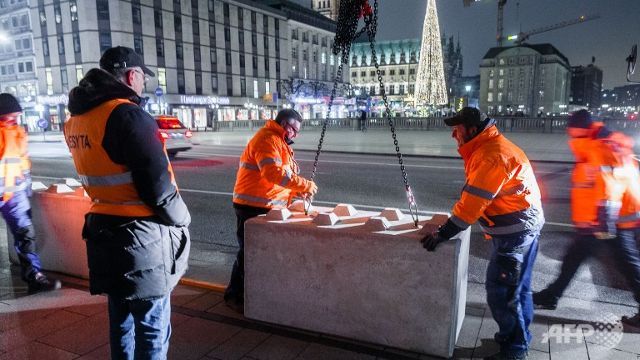Deadly truck attack sparks security debate in Germany
 |
| Workers place concrete blocs aiming to prevent terror attacks on Dec 20, 2016 close to a Christmas market in Hamburg, northern Germany, as security measures are taken after a deadly attack on a Christmas market in Berlin. (Photo: Markus Scholz/DPA/AFP) |
After a truck ploughed through a crowd of holiday revellers in central Berlin, the country - having so far been spared large-scale attacks - is debating the balance between security and an open society.
"This attack could have been prevented if the square had been protected by concrete barriers," said Joachim Krause, head of the Institute for Security Policy at Kiel University, about the attack that killed 12 people at a Berlin Christmas market Monday.
As in Israel, Germany needs "to systematically secure such places," Krause argued in business daily Handelsblatt.
"But in Germany this has been neglected, even though IS (Islamic State) is calling for just this kind of attack on so-called soft targets".
Some cities did quickly react to Monday's carnage - the Christmas markets of Hamburg, Stuttgart and Dresden installed concrete bollards following the Berlin attack.
On the other hand, federal police chief Holger Muench cautioned that, no matter what measures are taken, total security doesn't exist and that "there will always be a risk".
In a similar vein, Berlin mayor Michael Mueller argued that "if we secure everything, if we carry out checks at all the entrances to all public spaces, then that will be at odds with our culture of openness".
ARMY PATROLS?
Nonetheless the debate is, once more, heating up.
The CSU, the Bavarian wing of Chancellor Angela Merkel's conservative party, re-launched a campaign it initiated months ago, after less severe attacks claimed by the IS in Germany - to authorise army troops for domestic security duties.
The Bundeswehr should be able to use its training and equipment to support police and contribute to public safety, argued CSU lawmaker Florian Hahn, in comments to media group RND.
While the sight of armed soldiers on the streets has become common in European countries that have suffered militant attacks, such as France and Belgium, it remains taboo in Germany, which in the post-Nazi era set strict constitutional limits on its armed forces.
While men and women in uniform are allowed to, for example, fill sandbags during flood disasters, most Germans would object to the sight of armed troops guarding airports and railway stations.
The government recently moved to allow a first joint police-army exercise. But the country is a long way from authorising army patrols on the streets, with little will among policy-makers to push the point.
And, unlike in France, which has suffered several far deadlier militant attacks, no-one in Germany is currently proposing a state of emergency.
A member of Merkel's party, Klaus Bouillon, the interior minister of Saarland state, sparked controversy by speaking of a "state of war" after the Berlin attack - only to quickly backtrack from what many criticised as a verbal escalation.
FIRST 'REAL' ATTACK
"The Germans have always given the impression that they believe these attacks only happen to others," wrote Barbara Kunz of the Committee for the Study of Franco-German Relations in an online column for Le Monde.
The country "has certainly experienced attacks in the past" but still "the risk seemed unreal", she argued.
Therefore the Berlin truck attack - for which the IS claimed responsibility - meant "for many Germans that the country has experienced its first 'real' Islamist attack".
Police union deputy chief Ernst Walter meanwhile called for more video surveillance and urged an end to "demonising" the technology, in a country that - after the Nazi and communist dictatorships - remains suspicious of all kinds of surveillance.
"If politicians keep hiding behind privacy protection and the notion of individual liberty, which complicates our police work, then we will continue to have problems investigating such attacks in future," Walter said on public broadcaster ARD.
What the stars mean:
★ Poor ★ ★ Promising ★★★ Good ★★★★ Very good ★★★★★ Exceptional
Latest News
More News
- Russian President congratulates Vietnamese Party leader during phone talks (January 25, 2026 | 09:58)
- Worldwide congratulations underscore confidence in Vietnam’s 14th Party Congress (January 23, 2026 | 09:02)
- Political parties, organisations, int’l friends send congratulations to 14th National Party Congress (January 22, 2026 | 09:33)
- 14th National Party Congress: Japanese media highlight Vietnam’s growth targets (January 21, 2026 | 09:46)
- 14th National Party Congress: Driving force for Vietnam to continue renewal, innovation, breakthroughs (January 21, 2026 | 09:42)
- Vietnam remains spiritual support for progressive forces: Colombian party leader (January 21, 2026 | 08:00)
- Int'l media provides large coverage of 14th National Party Congress's first working day (January 20, 2026 | 09:09)
- Vietnamese firms win top honours at ASEAN Digital Awards (January 16, 2026 | 16:45)
- ASEAN Digital Ministers' Meeting opens in Hanoi (January 15, 2026 | 15:33)
- ASEAN economies move up the global chip value chain (December 09, 2025 | 13:32)
















 Mobile Version
Mobile Version